This was Kosovo less than two years ago:
Naturally, it would appeal to me to check a place like this out.
Now, I recognize that Kosovo is an obscure conflict to most Americans, even during the 78 days in 1999 when the United States was pummeling the place with bombs and cruise missiles.
So, I will recommend the following as the best book I have seen so far that will leave you with an understanding of the Kosovo War and Kosovo in general: Be Not Afraid, for You Have Sons in America: How a Brooklyn Roofer Helped Lure the U.S. into the Kosovo War by Stacy Sullivan, who covered the Balkans for Newsweek.
However, to provide the quick and dirty background for those of you that somehow do not have the book in front of you at this exact moment…
In Serbia, Milosevic had risen to power — and escaped the fate of other communist leaders in Eastern Europe — by fanning ethnic hatred. There was no greater such hatred than that between Serbs and Albanians. History had forced them together in the Yugoslav federation, with Kosovo a province inside the republic of Serbia. Serbs regarded Kosovo as their historical homeland, but on the ground in the province, Albanians outnumbered them nine to one. Albanians had long taken pride in harassing Serbs, forcing them to sell out and flee next door to Serbia.
Milosevic figured out that avenging Serb resentment over this harassment would cement his power. So he assured Serbs that Albanians would never beat them again. To that end, he created a brutal police state inside Kosovo that bullied and murdered Albanians. That, in turn, set off bullying and murderous retaliation by Albanians who slowly coalesced into the KLA.
The KLA then successfully sucked the United States and NATO into their nasty war. It was the most cynical and savage of public relations tricks. The KLA attacked and killed Serbian military and police, knowing full well that Milosevic would retaliate in a way that would nauseate the West.
And sure enough, it worked. Serb forces cut throats, gutted pregnant women, smashed the skulls of old men. The United States and Europe, guilty about their limpdick response to Milosevic’s war crimes in Bosnia, could not stomach it and quickly threatened to bomb, just as the KLA had hoped. Milosevic refused to back down, bombs fell, and Serbia lost the war. Before being forced out, Serb forces managed to destroy much of Kosovo and kill an estimated 10,000 people. Albanians then turned around and committed numerous revenge killings.
Milosevic is gone, but today’s Kosovo is far from being the best place to live. Impoverished, ill-governed and restive it has been all but forgotten by a world obsessed with terrorism and Afghanistan. The Balkans, though, have an enduringly toxic way of causing trouble that cannot be ignored.
Over the last decade Kosovo’s economy has suffered from political uncertainty and continuing ethnic hostility between Serbs and Albanians. Official figures say that 40% to 50% of the population is jobless, but the real situation could be even worse.
In many villages in Kosovo there are problems with electricity, running water and sewage. There are no regular buses, and hospitals and schools are few. Tens of thousands have already fled, and many more are considering it.
Nevertheless, the worst predictions of violence didn’t materialize after Kosovo declared independence from Serbia in 2008, perhaps because the Serbian government views gaining EU membership as a key strategic goal. The government’s highest priority is progress toward European Union membership and Serbia would rather avoid tensions in Kosovo if they threatened to get in the way of that objective.
****
Quick Facts:
1) Between 1941 and 1945 Kosovo was incorporated into the Italian-occupied Greater Albania.
2) KFOR is an acronym for Kosovo Force, the NATO-led international force responsible for “establishing a safe and secure environment in Kosovo.”
3) In 1998, the U.S. State Department listed the KLA as a terrorist organization, and in 1999 the hypocritical Republican Policy Committee of the U.S. Senate expressed its troubles with the “effective alliance” of the Clinton administration with the KLA due to “numerous reports from reputable unofficial sources that the KLA is closely involved with: the extensive Albanian crime network [and with] terrorist organizations motivated by the ideology of radical Islam, including assets of Iran and of the notorious Osama Bin Laden.”
****
Serbia does not officially recognize Kosovo as an independent state. So, I was unsure what to expect when driving from Serbia into Kosovo – or if Serbia would even acknowledge the border they officially refuse to accept. However, when we arrived at the border, Serbia did indeed have a checkpoint. A massive Serbian that resembled a well-armed bear glanced at my passport and then exclaimed, “Ahhh, you’re American.”
Oh shit.
I thought of American bombers and cruise missiles hammering Serbia during the 1999 Kosovo War and prepared for a difficult session with the Serbian.
Instead he grinned, handed my passport back to me and casually waved us through.
Entering Kosovo from Serbia:
At the border into Kosovo they gave us a much harder time – carefully examining all of our paperwork, searching our car and asking a lot of questions – and on the drive to Pristina we were stopped at roadblocks every few miles to repeat the process we went through when initially entering Kosovo.
Arriving in Pristina, we soon discovered that comfortable accommodations were hard to come by. In fact, any kind of accommodations were hard to come by. The few hotels in town were overflowing with UN staff and NGO personnel. This set of circumstances has made the few hotel owners in Pristina quite wealthy as they are able to charge astronomical prices to customers that stay indefinitely and are immune to price considerations as their costs are merely expensed to the United Nations. Unfortunately, this monopolistic situation has allowed the hotel owners to make a mockery of customer service and to not bother with maintaining their hotels.
After chasing rumored hotels and driving in circles all around the city, we eventually ended up at the poorly named Grand Hotel. We’ve stayed in some pretty extraordinary places and so the broken elevator didn’t faze us, the shabby and dimly lit interior didn’t put us off, nor did the lack of air-conditioning or basic plumbing and not even the holes kicked in the walls could bring us down. 100 euros a night in one of the poorest countries in the world seemed a bit steep, but thanks to the UN and NATO that was the minimum going rate at all of the hotels.
Upon discovering that our door would not close, however, and we were told that none of the doors in the hotel would close properly, Eleonora asked if we could perhaps have a slight discount on the room rate. The manager on duty assured us that this would be fine and we would just have to talk to the manager on duty when we checked out.
When we went to check out…
“Hahahaha. He told you what? No, I’m sorry, that is quite impossible. Hahaha”
“No, no, no one in this establishment would have told you such a thing.”
“If you want to leave this country, you’ll give us everything we want.”
To reinforce this threat a gang of thugs appeared with heavy iron bars in their hands and communicated that for both our own good and the good of our car that it would be in our best interest to hand over our euros. Lest we forget their hospitality, we were escorted out to our car by the iron-wielding crew of thugs and given a warm, friendly farewell that I won’t forget anytime soon.
As an interesting “oh by the way”… During the Kosovo War, some of the most-feared paramilitary units, such as Arkan and his Tigers, used the hotel as their base.
****
Interested in different points of view, we headed for one of the few Serbian enclaves remaining in Kosovo…
Gracanica
Gracanica is presently home to about 13,000 Kosovo Serbs and before the 1999 war, was a sleepy village built around a large agricultural collective and a home to Serb miners working in the nearby Kishnica mineral mines. As a result of the Kosovo War, however, Gracanica has developed into a satellite outpost of Pristina for the resident Serb community. Most of the approximately 30,000 Serbs who had lived in Pristina before 1999 left the town in just a few weeks, rightfully fearing reprisals from the returning Albanian population. Many left Kosovo altogether, never to return. But some, especially those with jobs working for the international community settled in Gracanica. With Serbian government funding, Gracanica was upgraded into a Serbian service center with Belgrade-financed health centers, university faculties linked to the Serb-language university in Mitrovica and Serb government outlets offering everything from Serbian passports to birth certificates to business registration.
Driving in you are reminded who is really running things in Kosovo… Fortunately, they no longer have the ring of security sealing off Gracanica from the rest of Kosovo to protect it from Albanian and Kosovar attacks (apparently the security cordon made traffic horrendous).
It’s funny, but the Serbian homes actually look, well, Serbian. Seriously. They have a distinctive look that sets them off from the homes in the rest of Kosovo:
Gracanica is covered with propaganda billboards like this one below, which must be difficult for the Serbs to stomach… Serbs leaving the region say Western countries are encouraging them to leave:
Note the Serbian flag being prominently displayed even though this is Kosovo:
Scenes of Gracanica:
In the heart of Gracanica is the Gracanica Monastery which is said to be a prime example of 14th-century Serb Orthodox art and late Byzantine architecture. It may be all that, but it is also a symbol and thus is a target for attack. That being the case, the grounds of the monastery are surrounded by miniature tank traps, razor wire and a battalion of Swedish troops:
And I haven’t seen a sign like this since Afghanistan:
The monastery was indeed an interesting building, especially considering that it was completed in 1322:
An Albanian prostitute was wandering the grounds of the monastery offering blowjobs to all of the men around. She was quite persistent with me, but I declined. I wish I had taken her picture though because she was quite lewd.
Inside the monastery:
Some of the very friendly Swedish troops guarding the facility:
Pristina
Returning to Pristina, it’s difficult to not be disappointed when you crest the hills surrounding the city and see it as it really is – tattered and grimy… A nearby lignite-fired power plant (the primary electricity source for Kosovo) creates a persistent haze and fills the air with the smell of coal.
Following the start of NATO air strikes against Yugoslavia on March 24, 1999, widespread violence broke out in Pristina. Serbian forces shelled several districts and, in conjunction with paramilitaries, conducted large-scale expulsions of ethnic Albanians. Naturally, this was accompanied by widespread looting and destruction of Albanian properties. Many of those expelled were directed onto trains brought to Pristina’s main station for the express purpose of deporting them to the border of the Republic of Macedonia, where they were forced into exile.
Scenes of Pristina today – home to around 500,000 people:
Some of the damage from the war is still quite evident:
UN Headquarters in Pristina:
There are places in the world where the United States is still viewed quite positively – Kosovo is one of them:
Perhaps not surprisingly, Bill Clinton is particularly popular in Kosovo given his role in the initiation of NATO strikes against Serbia:
As I was taking this picture below a group of three teenagers was walking past me. One of them looked up at the American flag and said clearly, “God bless America.” It is rare enough to hear that statement in America these days, but to hear it from the lips of a cynical teenager overseas is unheard of. It demonstrated to me that the Bill Clinton statue and the American flags were more than just self-serving government initiatives, but sincerely reflected the sentiments of the Kosovar population at large.
Greater Kosovo
Leaving Pristina one can see how quickly the city is spreading out over the plains:
Scenes of Kosovo:
Note the graves on the right – these are from the 1999 Kosovo War:
Some of the graves around this mosque were quite interesting – KLA fighters and others killed in the fighting:
Exiting Kosovo… KFOR troops and heavy security are very much present all around:
It will be interesting to see what happens with Kosovo when the UN, NGO, KFOR and NATO bubble deflates.
According to the United Nations, Kosovo has already become a major destination country for women and young girls trafficked into forced prostitution. According to Amnesty International, most women trafficked into Kosovo from abroad are from Moldova, Romania, Bulgaria and Ukraine.
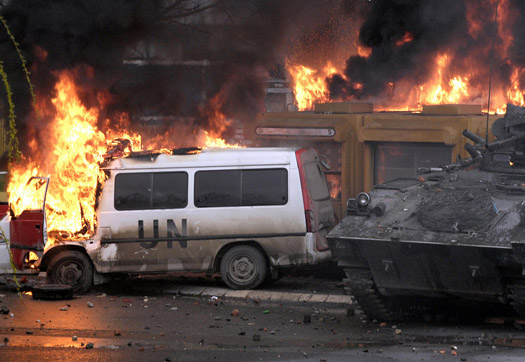
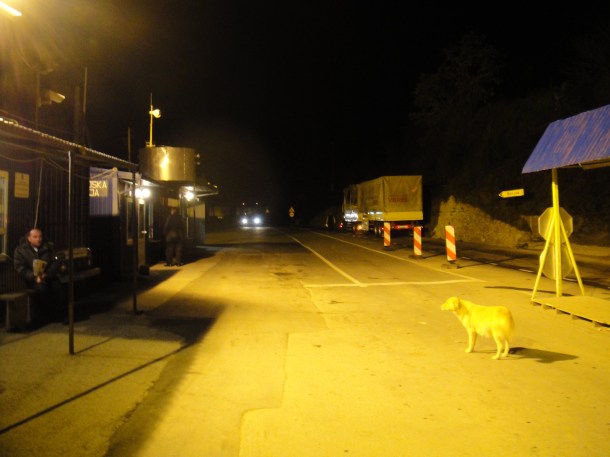
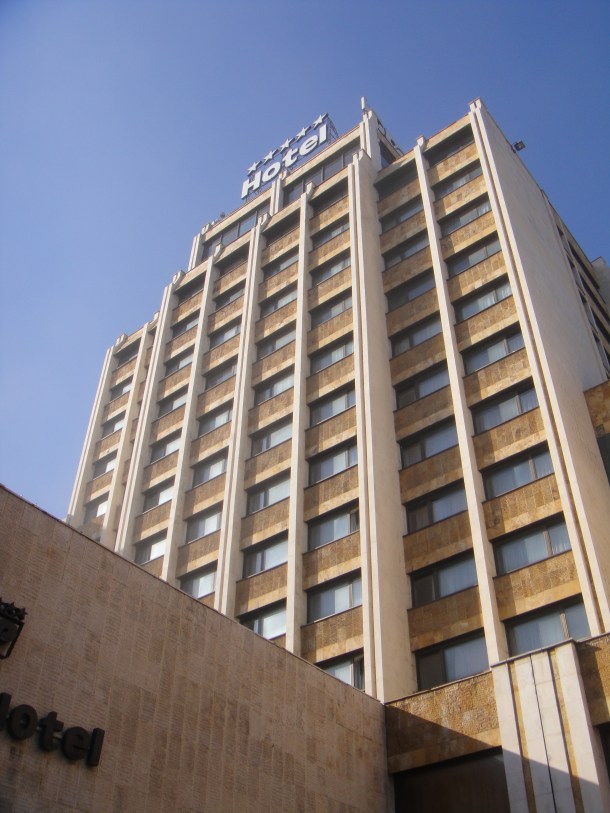
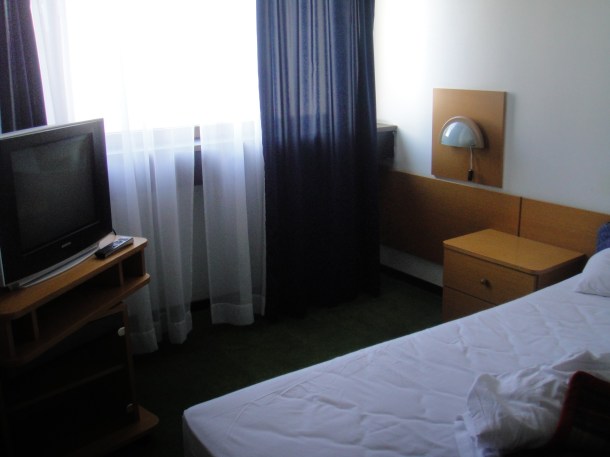
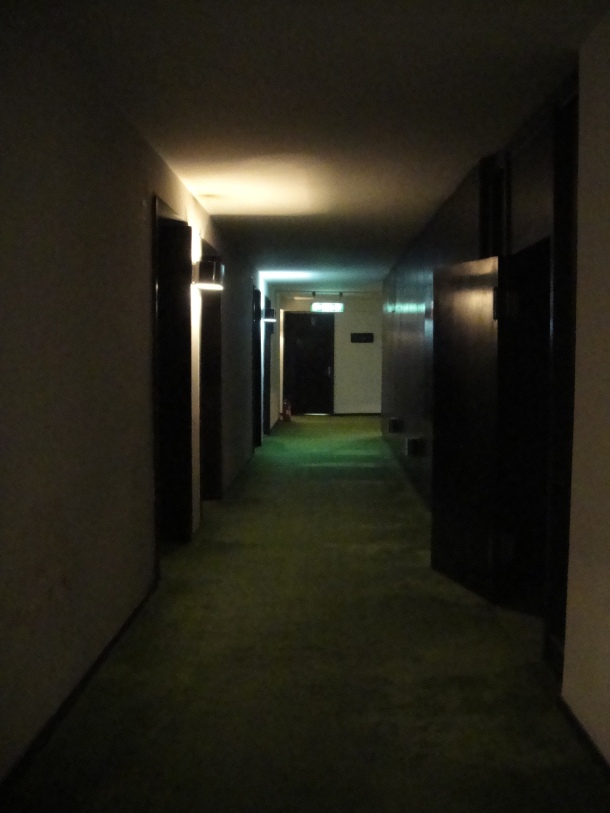
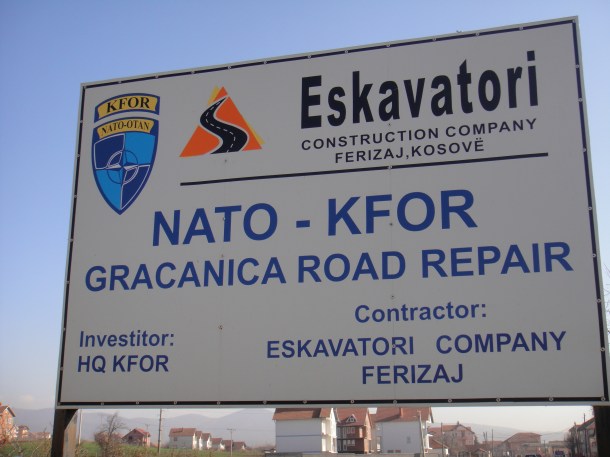
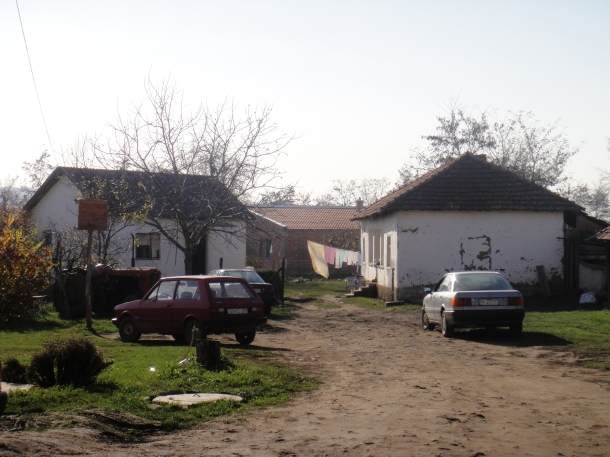
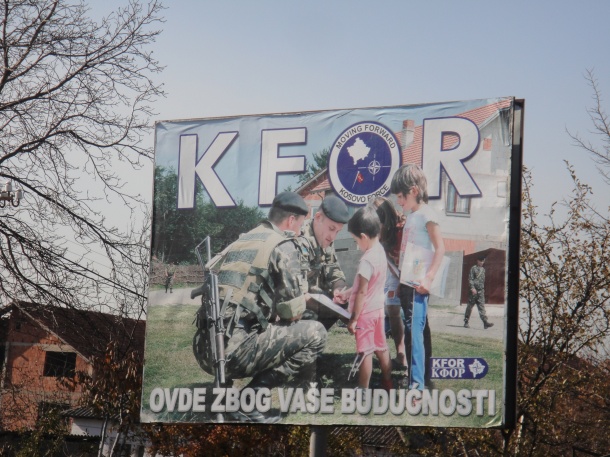
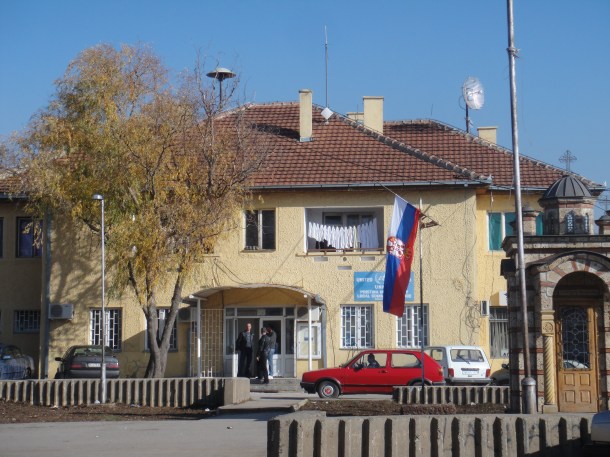
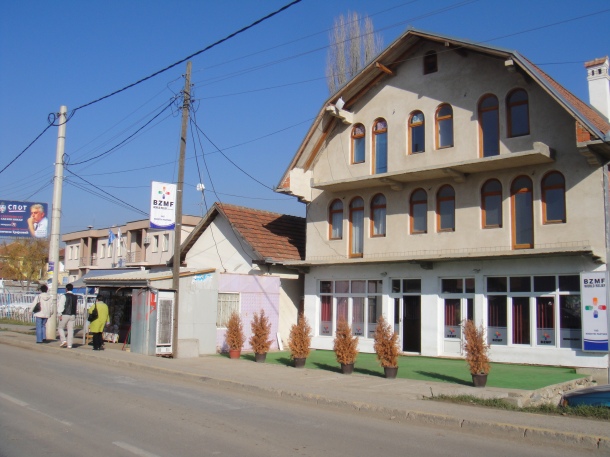
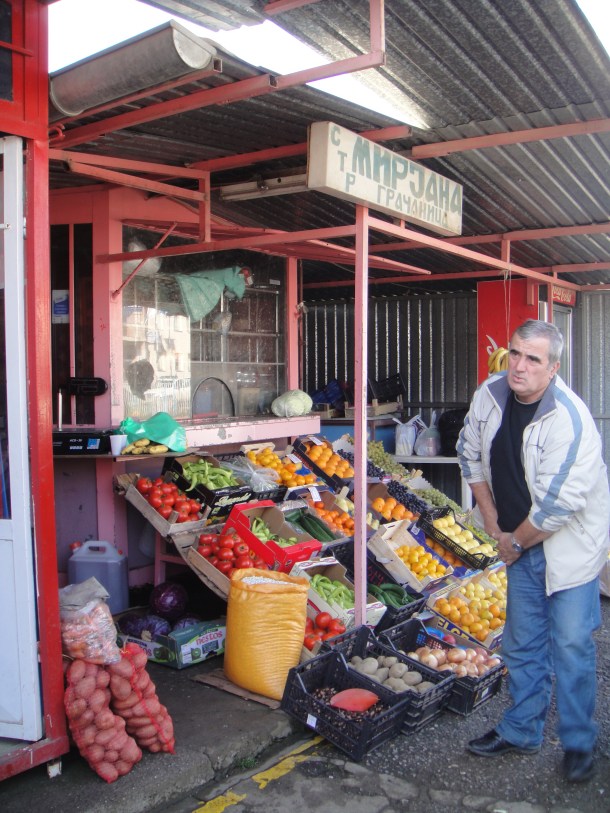
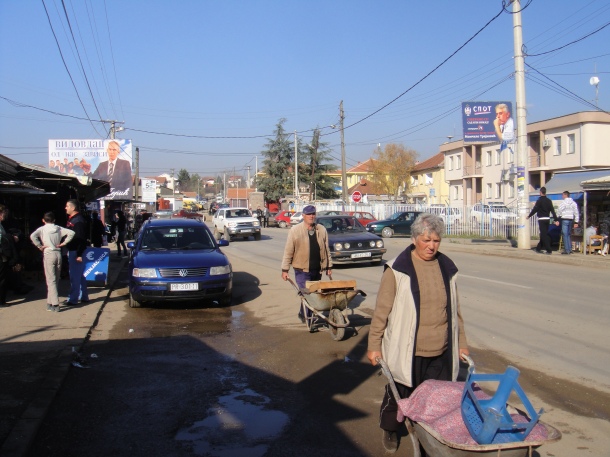
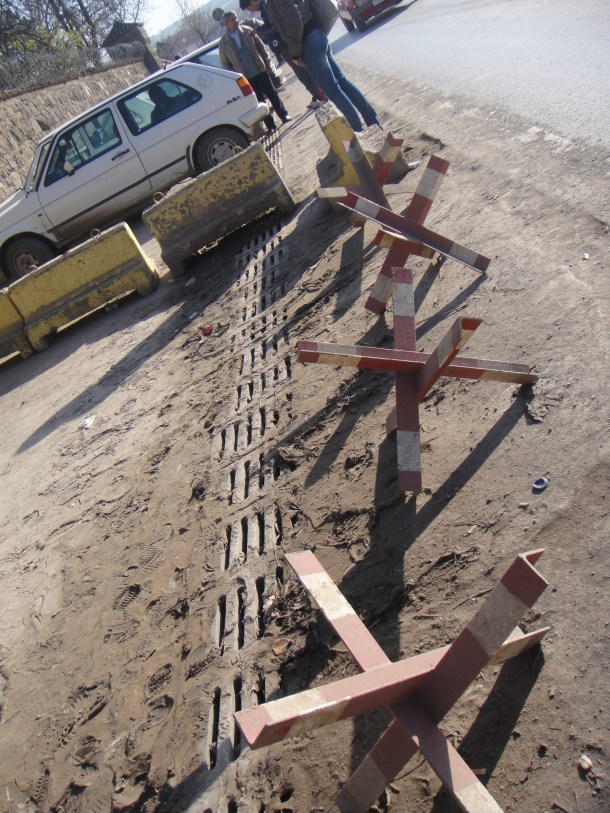
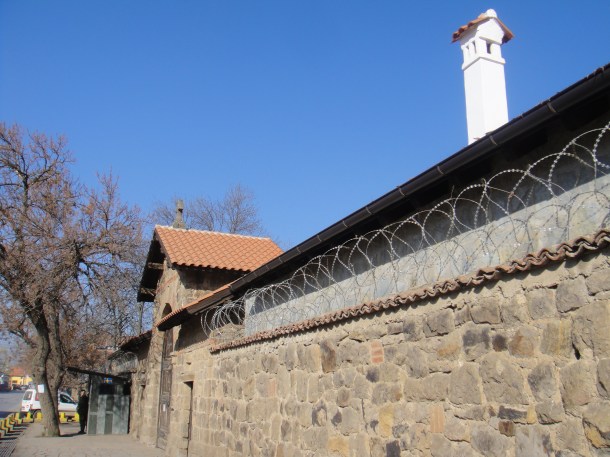
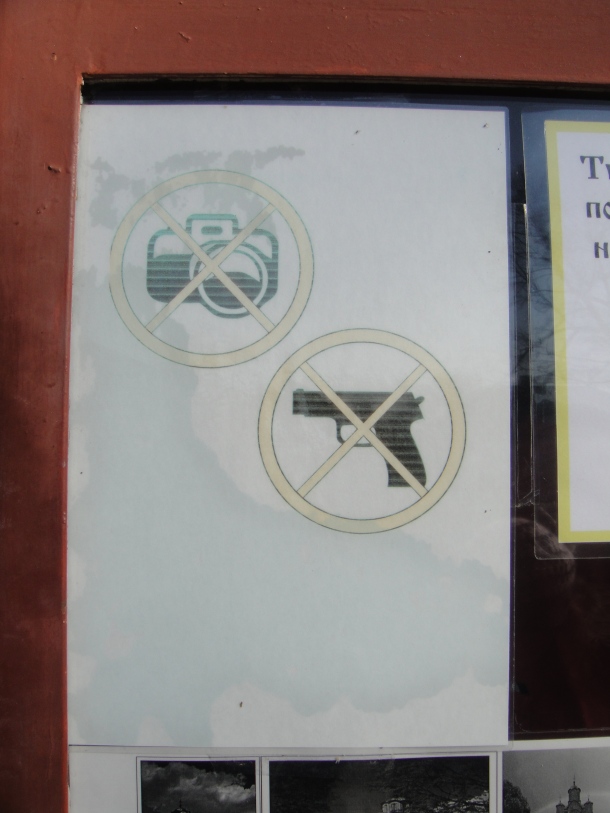
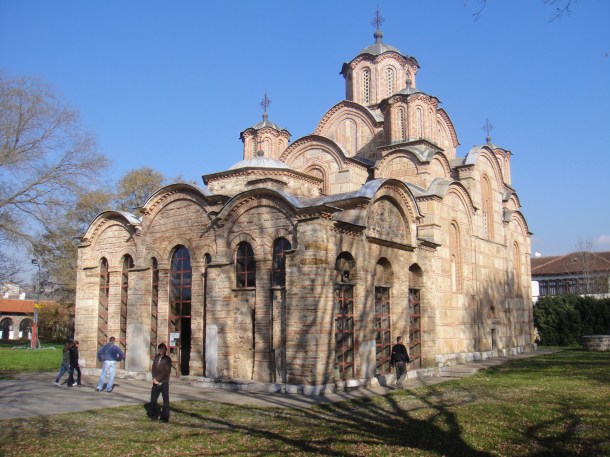
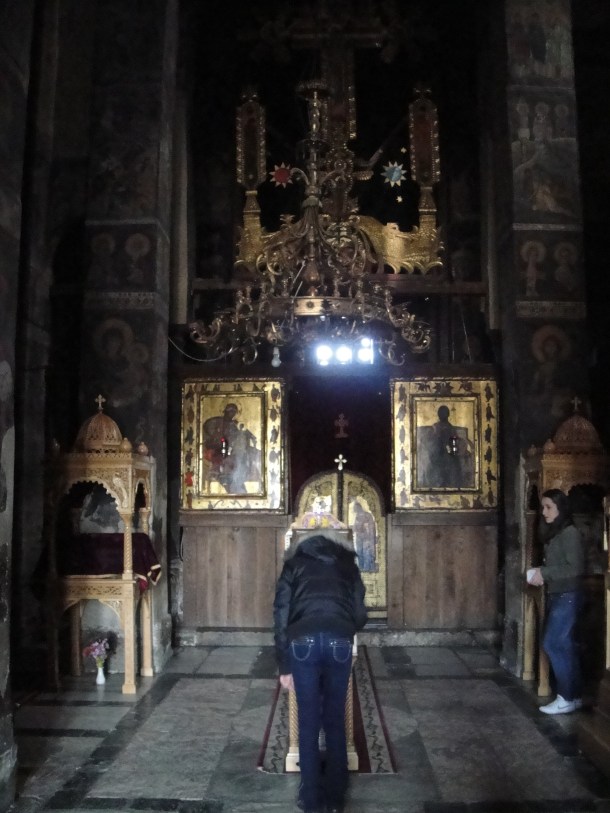
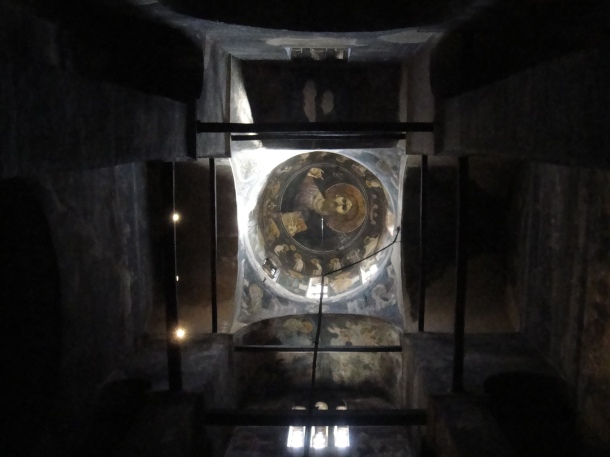
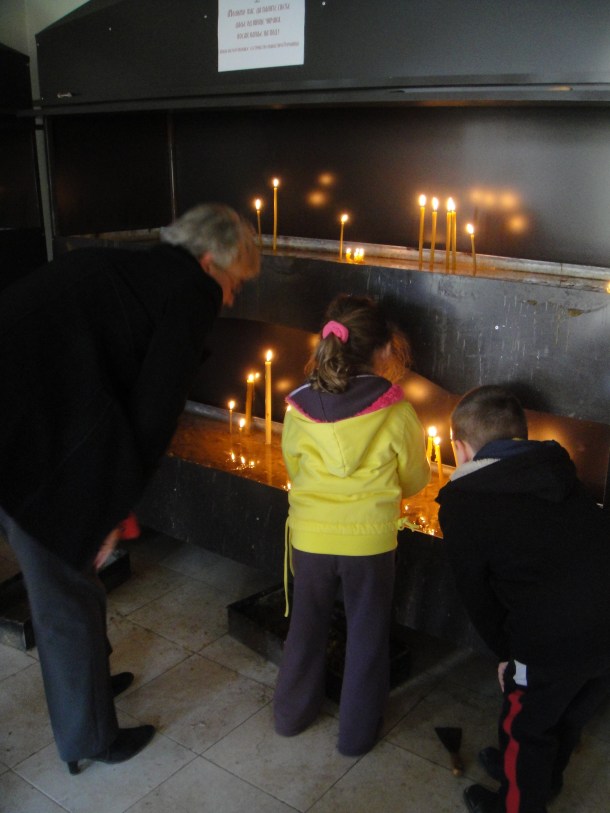
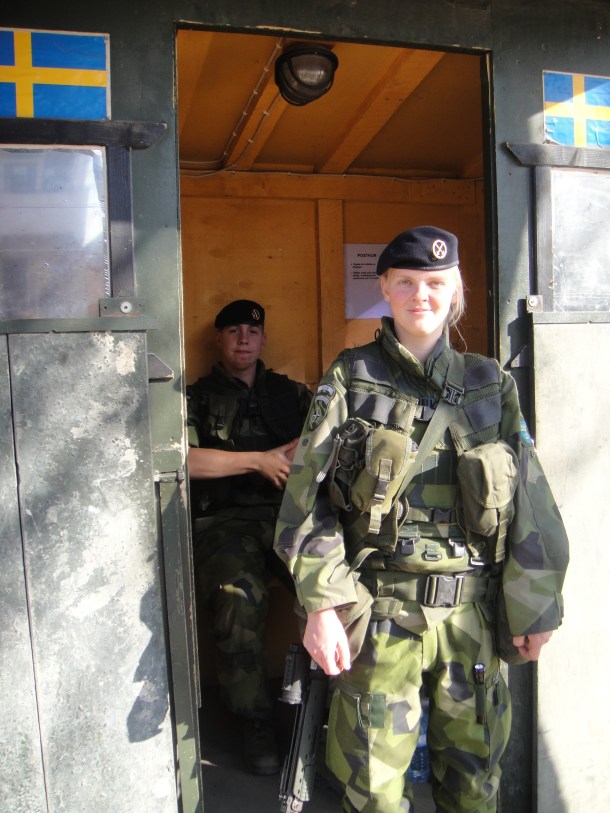
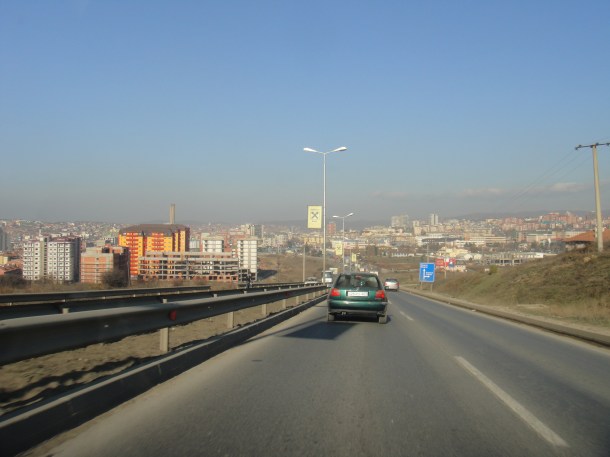
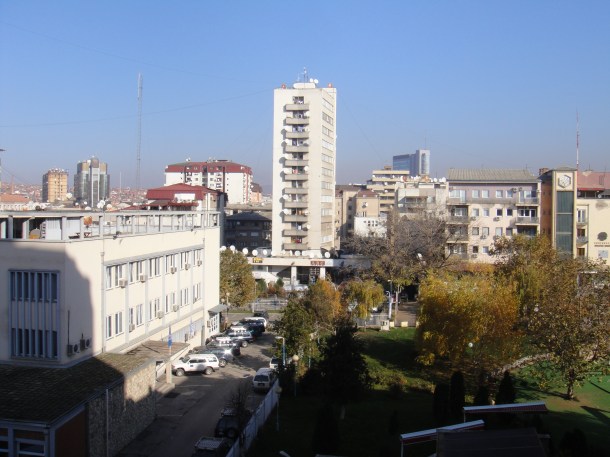
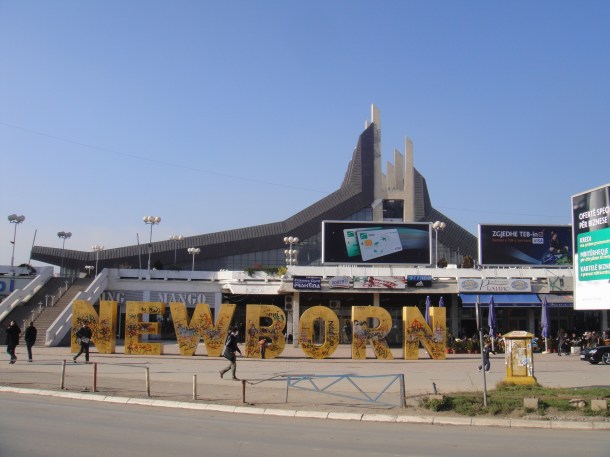
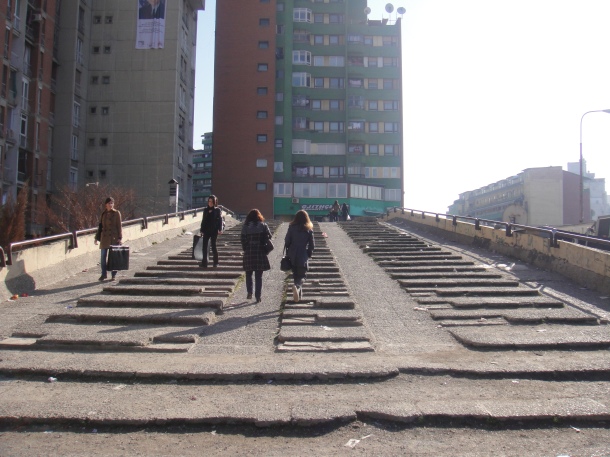
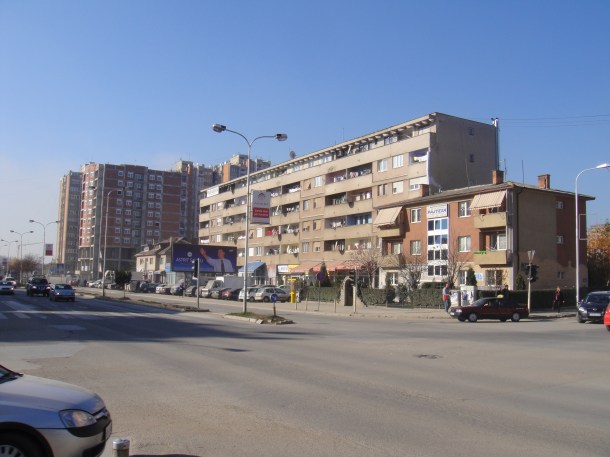
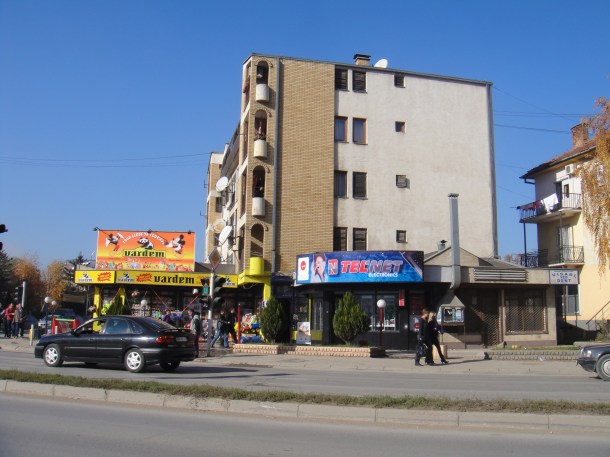
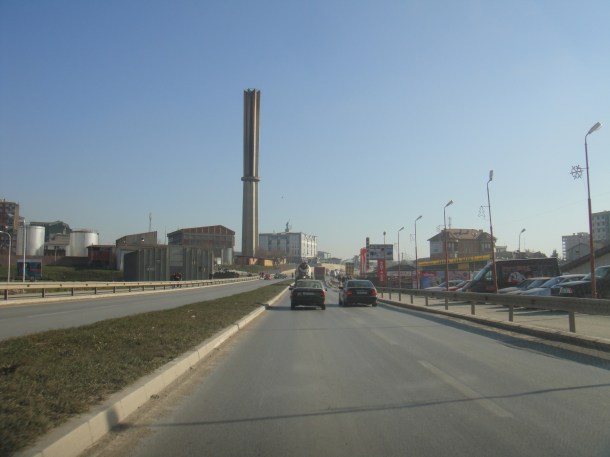
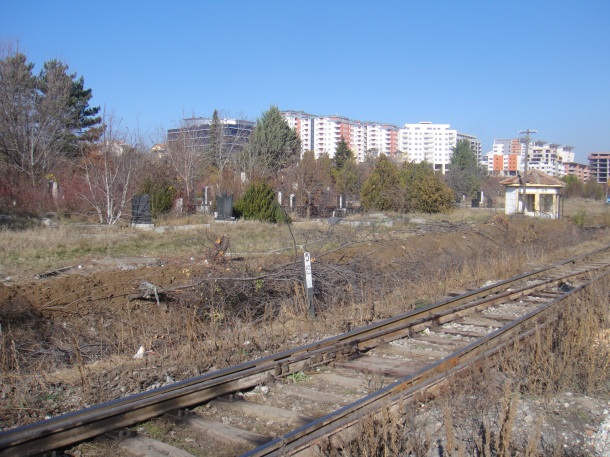
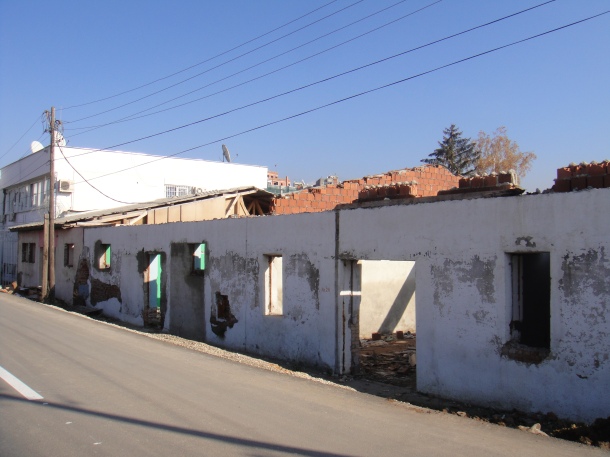
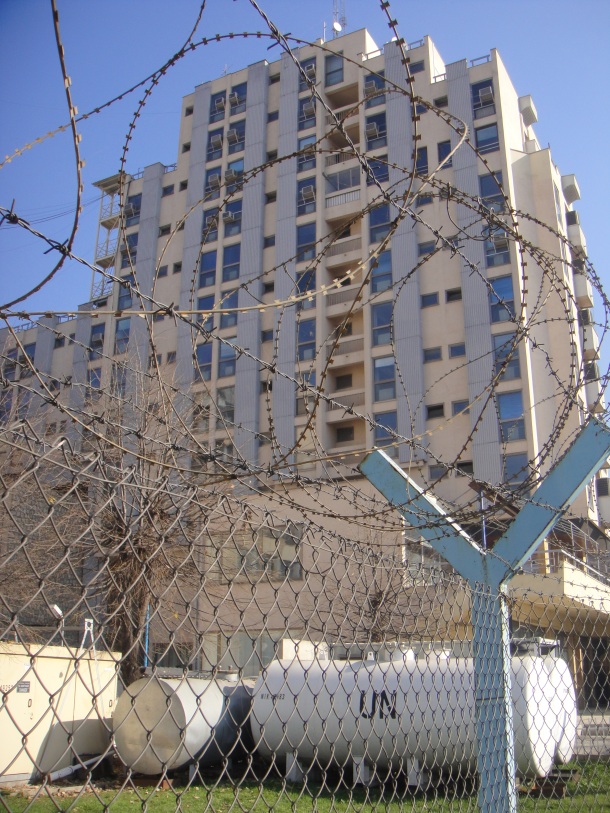
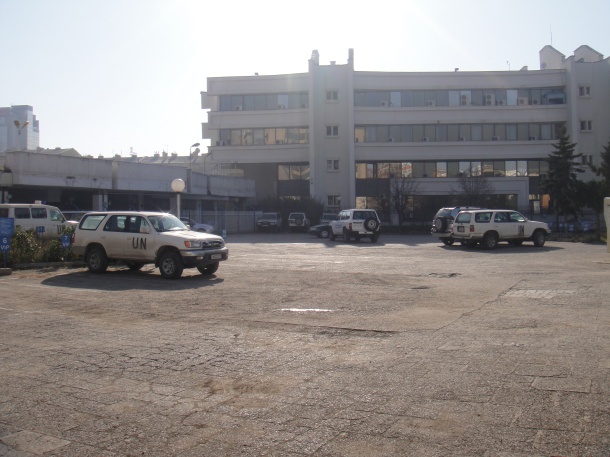
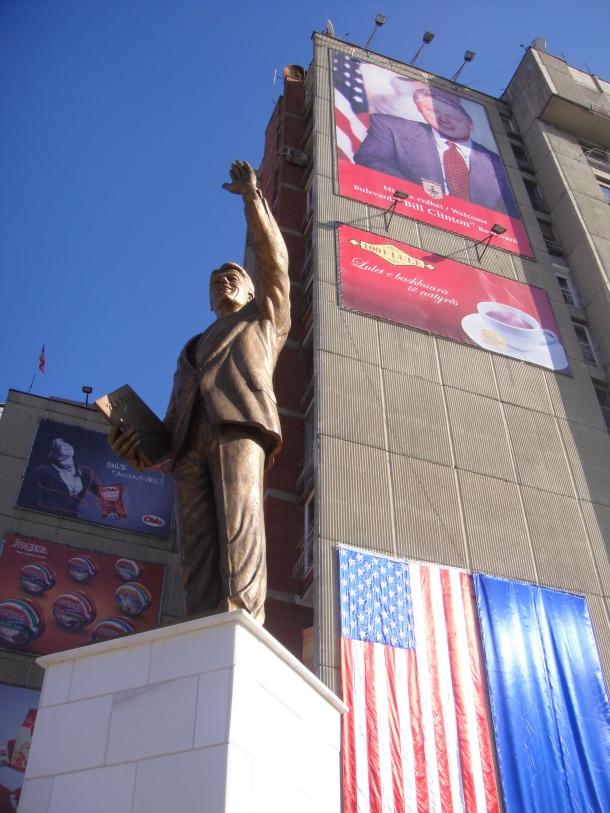
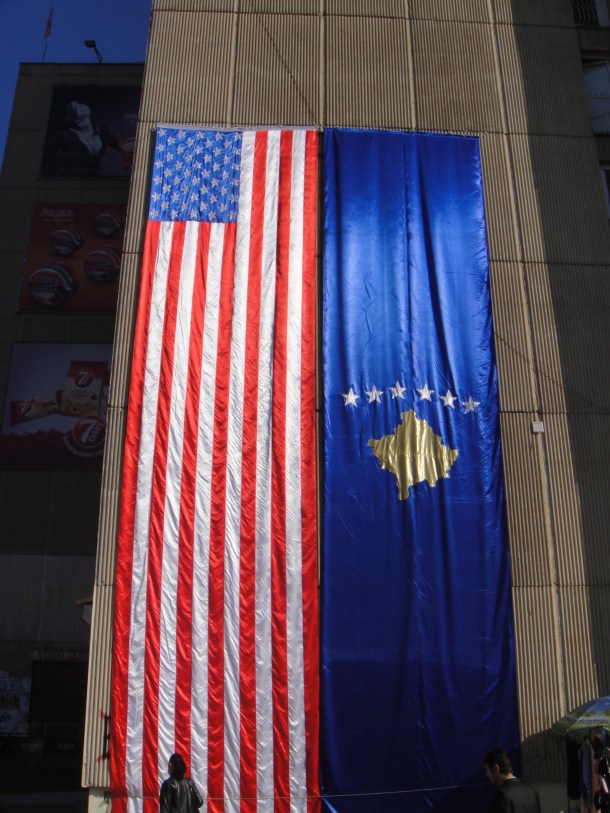
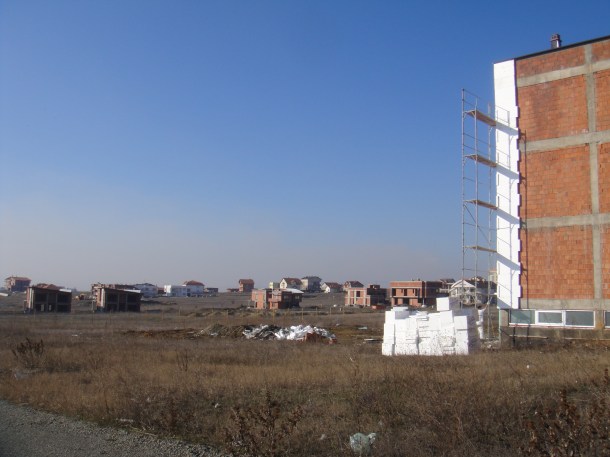
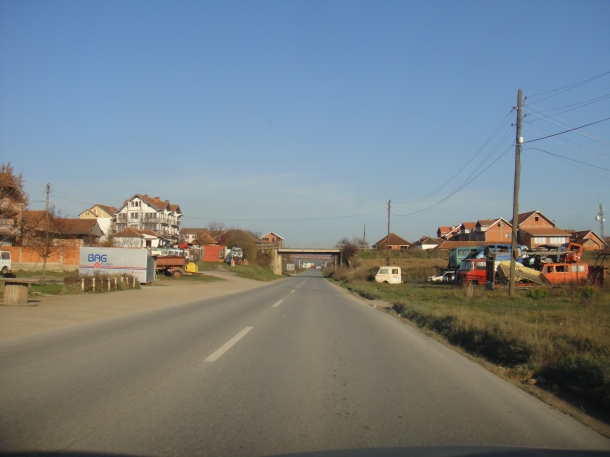
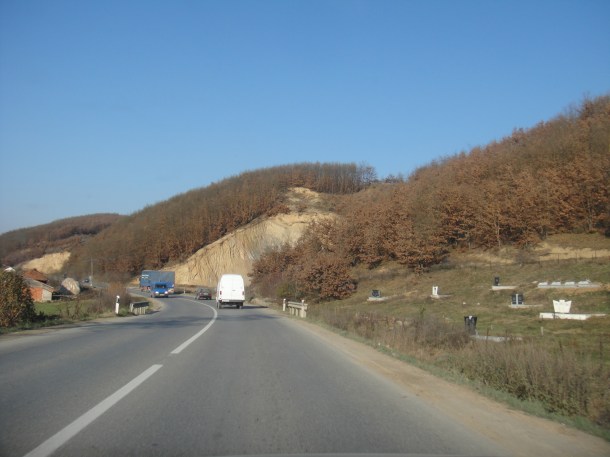
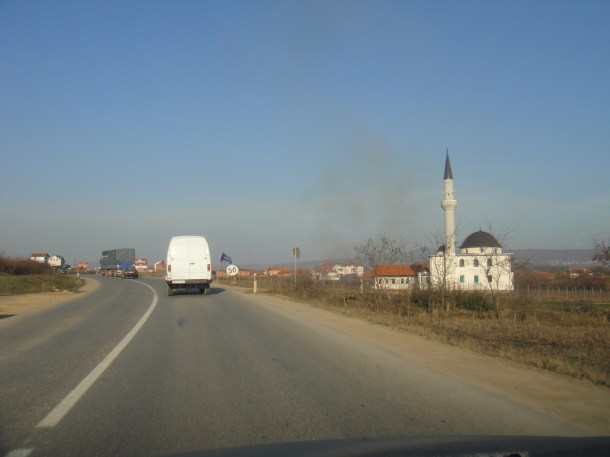
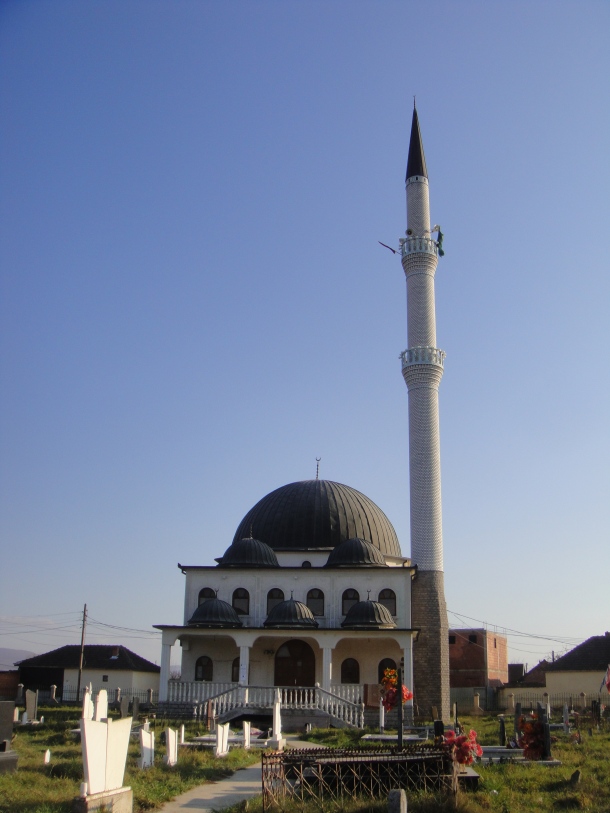
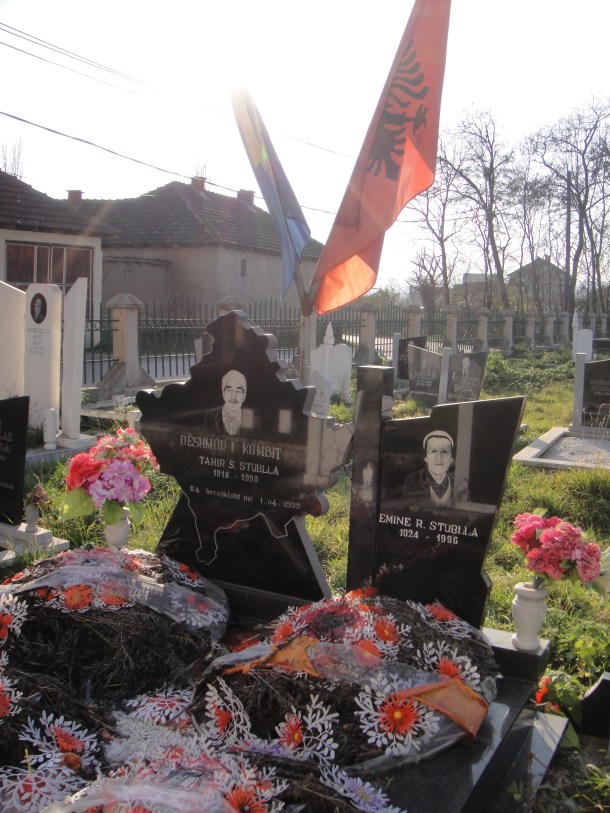
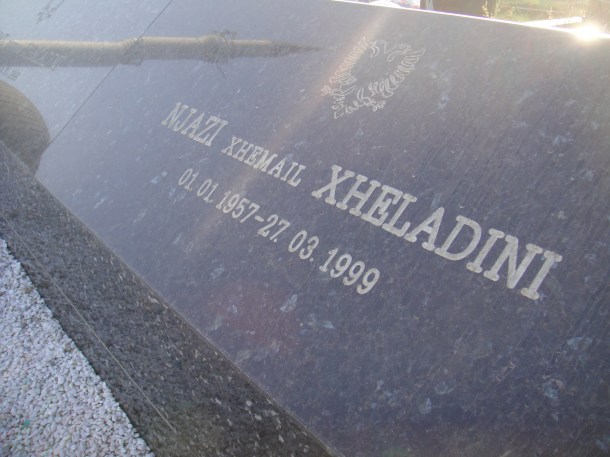
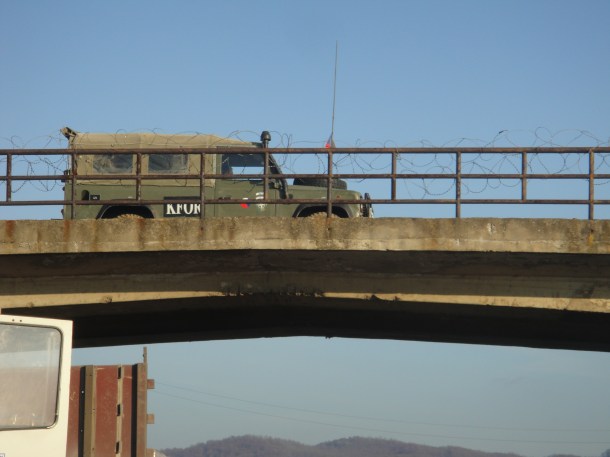
I really didn’t like Kosovo. And I’ve been in a lot of pretty sketchy places… All this NATO, NGOs bubble created a monster. People are arrogant and they treat you like shit, because they know they can do it. As soon as all these humanitarian organizations will be gone, Kosovo will turn in a complete shit-hole, even worse than what it is now. And it says something.
Eleonora i see from reading that you are Italian. Kosovo is a beautiful and wonderful COUNTRY. We would be powerful too without your oppression and occupation with the fascist Mussollini. What has Italy ever done for the world?
Oh so first its the Serbs now its the Italians … lol.
Ammm Kosovo is not a country, yet, and from what I hear far from being wonderful. I don’t know if it ever will be a country in the end, probably yes since the UN seems to be placating any sort of rebellion/separatist movement by granting them recognition.
Dear Metohija,
first of all, “Mussolini” is spelled with just one L, so if you wanna name someone, please try to do it properly next time.
Second of all, unfortunately, there is nothing that comes up in my mind, at the moment, that reminds me the great contribution of Kosovo to the world. Great artists? None. Great physicians? None. Let’s see… great musicians? Oh Gosh… no. Regarding what Italy “has done for the world” (mentioning your words), well, if you want I just can come up with a few FAMOUS names: Leonardo Da Vinci, Galileo, Cristoforo Colombo, Alessandro Volta, Guglielmo Marconi, Dante, Botticelli, Caravaggio, Michelangelo… for not talking about the Renaissance and the Roman Empire. Ever heard of them? What about Kosovo? I’d love to know.
And you’re still talking about the Italian occupation of Kosovo of ages ago? What about all the atrocities that Albanians and Kosovars did towards the Serbs during that period?
C’mon dude, if Kosovo is not able, ’till now, to recover from an occupation that happened ages ago, well it just confirms my theory.
Grow-up and start taking care of your shit, and please stop blaming other countries. If you’re fucked up you’re the only one to blame.
Now that Kosovo has declared independence and returned to the center of the world, it is astonishing, to see how the lies put out by the Serbians protest Kosovo independence fascist Milosevic regime and its Serbian imperialist predecessors have been recycled and have even become widely accept by global media. You are just propaganda for Serbia and Italy.
Kosovo is not al-Qaida or Hezbollah and we have a great man like Stephen Ahmad Suleyman Schwartz or Kujtesa Bejtullahu if you want examples.
Kosova is the greatest country alive with the greatest people, except for the Serbian asses who won’t leave and think that Kosovo/a is Serbian….Haha stupid idiots!!! It’s not stolen Kosovo. Let yourself be brainwashed or “sold” Serbian lies. You yourself have not travelled anywhere except Serbia and Kosovo to see the world much you arrogant Italian. We are peace-loving, honest and hard-working people. Not like Italians
Kosovo is not Al-Qaida or Hezbollah, no its the pro-western KLA which to do this day has not stopped targeted remaining Serbs and Orthodox Churches. Every country has great people and every country has bad people like Hashim Thaçi, Ibrahim Rugova just to name a few.
Kosovo is the greatest country with the greatest people, LOL LOL LOL ROTFL, never heard anything funnier that, the greatest country you mean the poorest European country with a never-ending ethnic conflict requiring a constant NATO peacekeeping presence to prevent full-out civil war, some greatest country this is. The greatest people you mean the KLA/UCK who burned down ancient Serb churches and forced out all remaining Serbs and if that was not enough the greatest people spilled over into Macedonia as the NLA asking for their territory, unfortunately for them NATO was not on their side this time.
“the Serbian asses who won’t leave and think that Kosovo/a is Serbian” sounds a lot like Milosevic in the 90’s “those Albanian asses who won’t leave and think Kosovo is Albanian”. “let yourself be brainwashed or sold Serbian lies”, what lies are they supposed to be sold Albanian?? American?? German?? French?? Italian?? Spanish?? everybody is sold the lies of their nation like you are sold the lies that you are the greatest nation in the world with the greatest people, are those not lies?. “have not travelled anywhere except Serbia and Kosovo” what does traveling have to do with any of this, he could have travelled to Antarctica for all you know, most Serbs have left Serbia anyway because of the ruined economy. “arrogant Italian” Lol again so firsts its the Serbs now the Italians, Italy recognizes your country as independent that can easily change. Anyway I though you were talking to the Italian so how is it that he has only been to Serbia and Kosovo, keep dreaming if you think any Italian is going to set foot in Kosovo, oh and keep up the
“We are peace-loving honest and hard-working people, Not like Italians” Want a comparison of which country is a better (Kosovo or Italy) and who is more hard-working, the 40%-50% unemployment rate in Kosovo answers this questions. Peace-loving? so what was the KLA-started war in 1990 peace-loving? The civil-unrest in 2004 was peace-loving oh no wait I forgot the evil Serb Asses who are brainwashed by Milosevic’s propaganda that don’t want to leave and think Kosovo/a is Serbian started the 2004 civil unrest yes thats it. Oh and thats why there are international peacekeepers stationed in the greatest most peace loving country in the world because you are so peace-loving oh wait sorry I forget its the evil Milosevic brainwashed Serbs asses that don’t want to leave and think Kosovo/a is Serbian are causing all the problems. “honest” yes very honest to claim you are the oldest European people and claim you are the oldest people in the world also the first ones to adopt christianity although you sold it later on because Islam is more attractive very honest and very good at history too. “hard-working not like Italians”, yes you are very hard-working that’s why you are the poorest in Europe, in fact one of the poorest in the World somewhere near Benin regardless of all the cash spent on you, and you are 40% unemployed mostly teenagers, very hard-working compared to the lazy now also evil brainwashed by the Serbian propaganda Italians. lol.
My dear Kosovo fan,
I have to say that I agree with you regarding the fact that Kosovo returned to the center of the world: it returned to the center of the world for begging for money from all the possible available countries, and, oh gosh, Kosovo received donations from Italy, as well. How shocking! And you know why? Because your “greatest country alive with the greatest people” (as you said) is AGAIN not able to take care of its own shit. When I went to Kosovo, I was shocked by the level of rubbish and run down houses I saw. So the question is: where is gone all the money that many countries injected into your “shit-hole”? Oh, I am sorry did I say “shit-hole”? I meant, “the greatest country alive with the greatest people”… that still has to learn how to run a country properly. How great is a country that is not able to stop blaming others (such as Serbia or Italy) for its own fuck-ups? Uhm, Interesting question. And what about the Italian propaganda? Well, sweetheart, I really don’t think I need to sell propaganda for Italy, my country it is perfectly able to stand on its own. Everybody knows about Italy and people are always talking about its landscape, history, famous artists, food, beautiful cities (not even comparable to Pristina)… but what about Kosovo? Many people are not even aware of the existence of such country called Kosovo. It is like a spit on the geographical map, do you get the idea, don’t know, my little poor-ignorant Kosovo supporter? Stephen Ahmad Suleyman Schwartz what? Kujtesa Bejtullahu who? Who the hell are these people? Let’s ask around if people know better Leonardo da Vinci or the whatever Kosovo “VIP”… I don’t know why, I’ll bet they would know better the Italian figure rather than the Kosovar one. I gave you a LONG list of names, just for mentioning a few, and you’re able to come up just with two obscure people? That’s all you are able to do?! How disappointing. Didn’t you say that Kosovo is “the greatest country alive with the greatest people”? Well, I was expecting a much better response from you. Well, unfortunately we can’t all come from a country with famous and intelligent people, can we? And to be honest with you, I’ve been to many, many countries in the world that you can’t even imagine, or probably just dream about it. I’ve been to war-zones countries, developing and developed countries, poor and rich countries… and everywhere I’ve been I’ve never seen the disaster I’ve seen in Kosovo. By the way love, I forgot, how much money your fabulous country gave to my country or any other country as a donation? Don’t know why, nothing comes up in my mind at the moment. C’mon dude, you’ve got to realize that everything you said it’s completely bullshit, and that Kosovo is situated at the very bottom of the list. Wake up dear. And you hard-working people? But if you live on all the donations that the world gave to you! Hahah… I have to admit that this was hilarious. Please, stop blaming other countries and try to become responsible for your own one.
Me arrogant? Well, at least I know how to speak and write in English. Grow up dude, the war is over.
Dear Sir/Madam,
I am trying to locate an old friend of mine – Suzana Zivic, who lived in Pristina. I got through to her on the phone whilst missiles were going overhead. I believe she worked for the government, but was respected by Serbs and Albanians alike. However, once the UN moved in, I could no longer contact her. Do you know how I may try to find her again. I know the DoB of her son, and names of her sister and cousin, although I don’t know if they may have married and changed their surnames. I also have their former address and telephone numbers, plus a few other details of education and places of work. I would be grateful if you could contact me by email.
With thanks.
Kind regards,
Kim Collins (Brighton, UK)
Violence Flares in Northern Kosovo
By GORDON FAIRCLOUGH
MITROVICA, Kosovo—Assailants struck in the middle of the night, setting fire to a car belonging to one ethnic Serb politician who favors cooperation with Kosovo’s Albanian-dominated national government and tossing a grenade at the home of another.
The attack last month in the town of Zvecan was part of a recent series of arsons and bombings that have swept across the north of this fledgling Balkan state, which declared independence from Serbia in 2008 after years of ethnic strife.
Many local Serbs—who make up the majority of the population in north Kosovo’s municipalities—don’t recognize the authority of Kosovo’s central government in Pristina, to the south, and say they would prefer to remain part of Serbia.
As Kosovo and Serbia prepare for talks aimed at improving relations, tensions have climbed here in the ethnically split town of Mitrovica and other parts of the north, as both sides maneuver to strengthen their positions before discussions start.
On Wednesday, U.S. Secretary of State Hillary Clinton stopped in Pristina and met Kosovo’s prime minister, Hashim Thaci. Mrs. Clinton, who visited Serbia Tuesday, called on both sides to “settle practical problems and overcome obstacles to being good neighbors.”
Mr. Thaci said it is time for “a new phase” in which Serbia and Kosovo can “cooperate and look to the future.”
Coming up with a solution that will bring peace to north Kosovo, which for the past decade has functioned largely as an extension of Serbia, will be critical to any lasting reconciliation between Pristina and Belgrade, diplomats say.
North Atlantic Treaty Organization peacekeeping troops and police officers deployed by the European Union have stepped up joint patrols with Kosovo police in the area and are using nightly check points in an effort to intercept weapons and explosives.
Much of the recent violence is aimed at intimidating local Serbs willing to engage with Kosovo’s leaders, EU and Kosovo officials say. Ethnic Serbs working for the Kosovo police, as well as politicians and even a post-office worker have been targeted, police say.
Hard-line nationalist Serbs “are sending very threatening messages to all Serbs who cooperate, who show a readiness to participate in Kosovo institutions,” says Ylber Hysa, the Kosovo government’s top official for the north.
But at times, anger has flared into broader clashes. After the Serbian national team was defeated by Turkey in a basketball tournament last month, jeering Albanian youths gathered near the main bridge between the two sides of Mitrovica.
Serbs from across the Ibar River responded and a stone-throwing melee erupted. International police forces stationed at the bridge fired tear gas to disperse the crowd. A French gendarme was shot in the leg, police said.
Distrust between Albanians and Serbs runs deep, rooted in decades of communal conflict. During the 1990s, as the former Yugoslavia disintegrated in warfare, Kosovo’s Albanian majority suffered persecution at the hands of the Serbian government.
A bloody Serb crackdown on Albanian separatists led to a NATO air war against Serbia and international administration of Kosovo. Serbs suffered reprisal attacks. And in 2004, rioting across the country destroyed Serb property and forced many to flee their homes.
In recent years, however, progress has been made. Kosovo has pursued a policy of decentralization, allowing Serb communities to elect their own municipal leaders and giving them broad authority over education, health care and other government matters.
Mrs. Clinton on Wednesday met mayors from such Serb enclaves in a Kosovo that is 90% Albanian. She said Washington would support them and that the success of Kosovo and its Serb minority are intertwined.
But the situation in Kosovo’s northern municipalities—which are adjacent to Serbia and home to more than 40% of the country’s Serbs—has long been different. In the Serb north side of Mitrovica, Serbian flags fly, signs are written in Cyrillic and the Serbian currency, the dinar, is legal tender.
A banner hangs along a main street proclaiming “Russia is with us.” Graffitti spray painted on walls, buildings and kiosks tells EU police to go home. One scrawled message uses a derogatory Serb word for Albanian and urges people to boycott Kosovo-sponsored elections.
The Serbian government pays the salaries at a university and medical center and provides welfare benefits to local residents. Belgrade officials work here. And local Serbs say they oppose any erosion of their autonomy.
The Kosovo authorities “have been trying for 10 years already” to assert control in the north, says Nenad Jovanovic, a 34-year-old who sells sunglasses and hats. “It’s our right to defend ourselves and we will succeed.”
Mr. Jovanovic, who moved to the north side of town after his house to the south of the river was torched during the 2004 riots, says he is afraid of going to Albanian-dominated areas. “I don’t trust them,” he says.
Oliver Ivanovic, a local Kosovo Serb who serves as state secretary in Serbia’s Ministry for Kosovo and Metohija, says the north needs “some kind of special status” that will “make us feel that we are freely connected with Serbia.” Anything less, he says, won’t work. “Emotions are too strong and too widespread,” he says.
In talks with Kosovo, Belgrade can be expected to push for a great degree of autonomy and authority for Serb communities in the north, as well as provisions that grant a sort of extra-territorial status to Serb churches and monasteries across Kosovo. The EU put enormous pressure on Belgrade to enter into negotiations, effectively tying Serbia’s membership in the EU to better ties with Kosovo.
In the past, some in Belgrade have called for Kosovo’s partition so that the northern municipalities can rejoin Serbia, something rejected by Pristina.
Earlier this year, Kosovo started trying to strengthen its hold in the north, opening a local-government office on the Serb side of Mitrovica. That sparked a demonstration at which a grenade exploded, killing a doctor. And since the country’s declaration of independence was declared legal by the International Court of Justice in July, the government in Pristina has sought to push ahead.
That has ratcheted up tension in the north. Kosovo’s decision in September to move ahead with efforts to disconnect the cellular phone network of Serbian Telecom, depriving many Kosovo Serbs of cellphone service, has stirred significant anger.
The government says the company doesn’t have permission to operate in Kosovo and doesn’t pay tax. Serbian officials say this is the sort of issue that should be addressed in the upcoming talks.
After the World Court ruling, “Pristina won the game,” says Momcilo Arlov, who runs a nongovernmental organization seeking to develop civil society in north Kosovo. “They should be generous in their victory” and work toward a plan for the north that will allow Belgrade to save face and protect the interests and autonomy of the region’s Serbs. “Both sides need to give up something,” he said.
Write to Gordon Fairclough at gordon.fairclough@wsj.com
Eleonora, I love you :D:D:D!
@Metohija
Why do you use Greek word for church property as your name? Jesus holy Christ, do you have something of your own to use, or you have to steel even the name for spreading shit over internet :D:D? One thing you don’t have to steel from the rest of the world and that is garbage which is growing all over Kosovo and Metohija like grass :) :). Soon you’re going to swim in garbage :). Hope you know how to swim at least :)
You who call yourself “Kosovo is Serbia”, you think I don’t check in from time to time to see what lies are being said about Kosovo? For those hate of Kosovo, I have been informed that Serbian agents are spreading trash around Kosovo, writing graffiti everywhere, stealing and being rude to outsiders in Kosovo to make Kosovo look bad. The trash is from Serbs in Kosovo,
You must be a agent of Serbia paid to spred lies and propaganda. I bet you can’t find anyone else that agrees with you to disagree with what I have written.
Kosovo is Serbia. Or Serbia is Kosovo? My friends say that we tricked the United States into attacking Serbia because Serbia and the United States should be friends. I don’t believe that though. I think Serbia and the United States ARE friends and that they knew the KLA was getting ready to invade and occupy Serbia. NATO attacked to prevent this from happening and I hate them for that. I know that Kosovo would be in control of Serbia now if NATO had not gotten in the way. I am sorry the KLA did not get into Serbia because you arrogants would have to keep your own trash then. .
“Serbian agents are spreading trash around Kosovo, writing graffiti everywhere, stealing and being rude to outsiders in Kosovo to make Kosovo look bad. The trash is from Serbs in Kosovo”
LOL biggest Bullshit I’ve seen in the millennium. Name one Serb still living in Pristina or any other ethnically Albanian area, I bet you can’t even name one Yugoslav (not even a muslim Slav) let alone a Serb so where are the Serbs that are spreading trash, being rude to outsiders, writing graffiti, some of it anti-Serb, anti-Slav and anti-Russian definitely must be written by Serbs. The trash is from Serbs??? you have been independent for 13 years now, no Serb has governed or even wants to set foot in Kosovo, clean up and take responsibility for your own mess.
“You must be a agent of Serbia paid to spred lies and propaganda. I bet you can’t find anyone else that agrees with you to disagree with what I have written.”
I agree with him and disagree with you and I am not a Serb.
“we tricked the United States into attacking”
How smart do you think you are, you didn’t trick them they tricked you. You and USA are not friends, you are now their ass-lickers who now have to follow every instruction they give you, I would be wary of saying you hate them.
“Serbia and the United States ARE friends” you seriously need to have your mental health examined, like saying Iraq and USA are friends, sure Serbia and USA must be the best example of friendship in the whole world. Why wouldn’t Serbia want to be the USA’s friend especially after the very friendly romantic bombing in 1999.
“KLA was getting ready to invade and occupy Serbia” I though this was evil Serb Milosevic’s propaganda, guess I was wrong. Also you use the world invade, did the extremely oppressed KLA come from Albania maybe as Kosovo was part of Serbia at the time.
“Kosovo would be in control of Serbia now if NATO had not gotten in the way. I am sorry the KLA did not get into Serbia because you arrogants would have to keep your own trash then.” Again isn’t this the evil Serb propaganda which you love to talk about and that NATO only entered for humanitarian reasons to prevent a genocide. Let me tell you what would have happened had it not been for NATO, the KLA would have been exterminated, they would not have even reached Pristina, they would have been exterminated, much like the FSA (Free Syrian Army) in Syria (no NATO involvement) is currently being exterminated by Bashar Al-Assad, same would have happened with the free Libyan Army, they would have been exterminated by Gaddafi had it not been for NATO, NATO only gets involved if its proxy is too incompetent to finish the job.
Kosovo PM is head of human organ and arms ring, Council of Europe reports
Two-year inquiry accuses Albanian ‘mafia-like’ crime network of killing Serb prisoners for their kidneys
* guardian.co.uk, Tuesday 14 December 2010 15.17 GMT
Kosovo’s prime minister is the head of a “mafia-like” Albanian group responsible for smuggling weapons, drugs and human organs through eastern Europe, according to a Council of Europe inquiry report on organised crime.
Hashim Thaçi is identified as “the boss” of a network that began operating criminal rackets in the run-up to the 1999 Kosovo war, and has held powerful sway over the country’s government since.
The report of the two-year inquiry, which cites FBI and other intelligence sources, has been obtained by the Guardian. It names Thaçi as having over the last decade exerted “violent control” over the heroin trade.
Figures from Thaçi’s inner circle are accused of secretly taking captives across the border into Albania after the war, where a few Serbs are said to have been murdered for their kidneys, which were sold on the black market.
Legal proceedings began in a Pristina district court today into a case of alleged organ trafficking discovered by police in 2008. That case – in which organs are said to have been taken from impoverished victims at a clinic known as Medicus – is said by the report to be linked to Kosovo Liberation Army (KLA) organ harvesting in 2000.
It comes at a crucial period for Kosovo, which on Sunday held its first elections since declaring independence from Serbia in 2008. Thaçi claimed victory in the election and has been seeking to form a coalition with opposition parties.
Dick Marty, the human rights investigator behind the inquiry, will present his report to European diplomats from all 47 member states at a meeting in Paris on Thursday.
His report suggests Thaçi’s links with organised crime date back more than a decade, when those loyal to his Drenica Group became the dominant faction within the KLA.
It says the group’s supremacy over splinter groups in the guerrilla movement enabled them, from 1998, to seize control of “most of the illicit criminal enterprises” in which Kosovans were involved south of the border, in Albania.
During the Kosovo conflict, Slobodan Milošević’s troops responded to attacks by the KLA by orchestrating a horrific campaign of ethnic cleansing against ethnic Albanians in the territory. As many as 10,000 are estimated to have died at the hands of Serbian troops.
While deploring Serb atrocities, Marty said the international community chose to ignore suspected war crimes by the KLA, “placing a premium instead on achieving some degree of short-term stability”.
He concludes that during the Kosovo war and for almost a year after, Thaçi’s forces meted out revenge against Serbs, Roma and ethnic-Albanians accused of “collaborating” with the enemy.
Thaçi and four other members of the Drenica Group are named in the report as having carried out “assassinations, detentions, beatings and interrogations”. This same hardline KLA faction has held considerable power in Kosovo’s government over the last decade, with the support of western powers keen to ensure stability in the fledgling state.
The report paints a picture in which ex-KLA commanders have played a crucial role in the region’s criminal activity over the last decade.
It says: “In confidential reports spanning more than a decade, agencies dedicated to combating drug smuggling in at least five countries have named Hashim Thaçi and other members of his Drenica Group as having exerted violent control over the trade in heroin and other narcotics.”
Marty adds: “Thaçi and these other Drenica Group members are consistently named as “key players” in intelligence reports on Kosovo’s mafia-like structures of organised crime. I have examined these diverse, voluminous reports with consternation and a sense of moral outrage.”
His inquiry was commissioned after the former chief prosecutor for war crimes at The Hague, Carla Del Ponte, said she had been prevented from investigating senior KLA officials.
Her most shocking claim, which she said required further investigation, was that the KLA smuggled captive Serbs across the border into Albania, where their organs were harvested.
The report, which states that it is not a criminal investigation and unable to pronounce judgments of guilt or innocence, gives some credence to Del Ponte’s claims. It finds the KLA did hold mostly Serb captives in a secret network of six detention facilities in northern Albania.
Thaçi’s Drenica Group “bear the greatest responsibility” for the ad-hoc prisons and the fate of those held in them.
They include a “handful” of prisoners said to have been transferred to a makeshift prison just north of Tirana, where they were killed for their kidneys.
The report states: “As and when the transplant surgeons were confirmed to be in position and ready to operate, the captives were brought out of the ‘safe house’ individually, summarily executed by a KLA gunman, and their corpses transported swiftly to the operating clinic.”
The same Kosovan and foreign individuals involved in the macabre killings are linked to the Medicus case, the report finds.
Marty is critical of the western powers which have provided a supervisory role in Kosovo’s emergence as a state for failing to hold senior figures, including Thaçi, to account. It criticises “faltering political will on the part of the international community to effectively prosecute the former leaders of the KLA.”
It concludes: “The signs of collusion between the criminal class and the highest political and institutional office holders are too numerous and too serious to be ignored.
“It is a fundamental right of Kosovo’s citizens to know the truth, the whole truth, and also an indispensable condition for reconciliation between the communities and the country’s prosperous future.”
“If as expected the report is formally adopted by the committee this week, the findings will go before the parliamentary assembly next year.
Thug Life
Think Mubarak was bad? Kosovo’s leaders are accused of being organ-smuggling, drug-dealing goons — and the United States is looking the other way.
BY WHIT MASON AND BRONWYN HEALY-AARONS | FEBRUARY 17, 2011
Amid fireworks and celebratory gunfire, Kosovo — Europe’s newest country — turned three years old on Thursday, Feb. 17. But behind the scenes of revelry in the capital, Pristina, it’s clear that it will take a lot more than flag-waving for the fledgling country to grow out of its terrible twos. For all the hope that was once showered upon this young democracy, it still faces an enormous uphill battle: the country has no international postal or telephone code; it cannot establish its own IP address; its athletes cannot partake in many international sporting events; thousands of NATO troops still remain as peacekeepers; and Kosovars can only travel visa-free to five countries — one of which is Haiti. With only 75 out of 192 nations having recognized the new state, it remains in a purgatory of semi-sovereignty.
COMMENTS (0) SHARE:
Twitter
Reddit
Buzz
Bookmark and Share More…
Meanwhile, it’s been a big start to the year for new states and new orders. The regimes in Tunisia and Egypt have fallen. Southern Sudan claimed its independence with a near unanimous result. A wave of reform protests continues across the Middle East. After a bit of diplomatic wavering, the United States reaffirmed its commitment to self-determination and human rights, promising to support “principles, processes and institutions — not personalities” in its engagement with the new governments taking root in North Africa.
Trouble is, a sobering assessment of the successes and failures of state-building since the end of the Cold War demonstrates that governance and development work best when a population rallies behind an enlightened leader — and suffer when one does not emerge. Principles of democracy and human rights have to abide in a leadership and be bought into by a population.
And here’s the rub: While the United States grappled with its inability (whether for lack of a fulcrum or fear of meddling) to use leverage to remove the regimes in Tunis and Cairo, it actually does have the power to affect change and promote transparent and accountable governance in Pristina — where a coterie of thuggish leaders, holdovers from a Kosovo Liberation Army (KLA) unit accused of war crimes and weapons dealing, now run the country. But, thus far, Washington has been unwilling to exert the necessary pressure on Kosovo’s leaders — and in its impotence pours billions of dollars down the drain and risks condemning the state to thugocracy.
While much has been made of America’s financial support of Egyptian President Hosni Mubarak’s regime and other autocratic dictatorships in recent weeks, Kosovo’s democracy has received far more direct American aid in recent years — in 2010, Kosovo received more than twice the American bilateral foreign assistance per capita than Egypt. Yet, after more than a decade of immense international investment and the best-resourced humanitarian mission the world has ever seen, Kosovo enters its fourth year of independence amid its own internal turmoil.
Yesterday, Serbian Foreign Minister Vuk Jeremic requested that the United Nations Security Council investigate allegations of organ trafficking and other serious war crimes submitted to the Council of Europe by Swiss Euro MP and former prosecutor Dick Marty in December of last year. The human rights atrocities were allegedly carried out against ethnic Serbs and Albanians accused of collaborating with Serb forces during the 1998-1999 conflict in the former Serbian province. Those accused of carrying out the acts include senior members of Kosovo’s central government.
As it turns out, U.S. support for the world’s youngest democracy has been almost as bad for economic security, political stability and democratic principles as backing the globe’s oldest autocracies. Kosovo remains the poorest country in Europe. Just under half the population is jobless and living in poverty, 14 percent in extreme poverty. The women of Kosovo produce Europe’s highest birth rate while facing its worst maternal and infant mortality rates. Only one in five youth under the age of 25 are employed. Access to health care and education outside the major cities is limited. Electricity supply remains patchy across the country — despite donor funding in excess of €1.1 billion.
Of course, human and economic development in war-torn societies can be a slow and arduous process. The world should not expect its investment to instantly bear fruit. But support for Kosovo has been premised on developing a politically stable, democratic country.
In actuality, it has entrenched deep political divisions in an already fragmented government and ensconced an elite that now operates above the law. Having failed to improve Kosovo’s moribund economy and human development indicators, the former-KLA power brokers of the central government have somehow managed to accrue personal wealth vastly out of proportion with their declared activities. Their development and state-building policy has largely consisted of maintaining its own power over institutions of state, security, and law and order.
Until last year, keeping Kosovo stable — or at least appearing so — had been prioritized by the international community over pursuing clear evidence of increasing corruption among senior government officials. But, as the international money poured in throughout 2010, the veneer cracked. A wave of organized crime, war crime, and corruption allegations swept the senior membership of the Kosovo government and the leaderships of its major political parties.
On April 28, 2010, international police raided the offices and home of Transport and Telecommunications Minister Fatmir Limaj in connection with a corruption probe into a €700 million infrastructure project. Suspected of soliciting bribes and laundering up to €2 million from the public purse, the raid on Limaj was the result of a two-year investigation that started shortly after he took office in January 2008. At that point, he had only just returned in September 2007 from his second trial at the International Criminal Tribunal for the former Yugoslavia ICTY — indicted but never convicted of illegal imprisonment, cruel treatment, and inhumane acts during the war with Serbian forces in 1998-1999.
At the time of Limaj’s arrest, the European Union Rule of Law Mission in Kosovo (EULEX) announced he was only one of seven ministers being investigated for links to organized crime and corruption in office.
Two months after the raid on Limaj, on July 21, 2010 popular former Prime Minister Ramush Haradinaj was indicted for a second time by the ICTY to stand trial for war crimes including torture, rape, and crimes against humanity. His application for provisional release was denied and he currently awaits trial in remand at the United Nations Detention Unit in The Hague. On Jan. 31, it was announced that the opposition party he leads from his cell, the Alliance for the Future of Kosovo, placed fourth in the general election — taking a substantial 11 percent of the vote.
Two days after Haradinaj’s arrest, Kosovo police arrested central bank governor Hashim Rexhepi on charges of corruption, tax evasion, and money laundering.
But it was the leaking of a Council of Europe (CoE) report just days after Kosovo’s first post-independence election on December 2010 that really put this criminality and corruption out in the open. On Dec. 12, human rights rapporteur Dick Marty submitted a report to the CoE containing serious accusations against the local leadership and international missions currently presiding over Kosovo.
The report alleged that the ICTY, United Nations, NATO, and individual Western governments had failed to thoroughly investigate serious war crimes committed by the members of a KLA unit known as the Drenica Group during the 1998-1999 conflict with Serbia. According to Marty’s report, the unit had violently seized and operated the lucrative trading routes across the Prokletije mountain range on the Kosovo-Albania border. He alleges the group amassed considerable fortunes supplying weaponry to local forces — and trafficked in human beings, heroin, and organs taken from Serb and Albanian prisoners of war.
Marty’s report identified the leader of Drenica Group as a man called “The Snake” — a.k.a. Hashim Thaqi, who two days earlier had been named prime minister re-elect of the Republic of Kosovo. He has officially taken office in time for Kosovo’s third Independence Day celebrations.
All of the condemned leadership have been quick to accuse the international community of “political lynching,” interfering with domestic affairs of state, and inappropriate investigations into an independent government. Hardly.
In fact, the most disturbing aspect of these events were the revelations that Kosovo’s thugocrats owe their rise and continued impunity to the toleration or outright support of the international community — particularly the United States.
From the outset of the NATO intervention into Kosovo in June 1999, it was an American-devised strategy that drove allied forces to combat Serb atrocities through a 78-day aerial bombardment. Explicitly eschewing a land assault meant control on the ground fell to KLA forces — with dire consequences for the safety of their Albanian opponents and the ethnic minorities of Kosovo. The summer of 1999 saw violent retaliatory attacks claim the lives of some 50 Serb and Roma civilians a week before the international forces regained control.
This strategy also set the terms for a co-dependent relationship between the West and the former KLA leadership to maintain a stability that took far too long to establish in the aftermath of the 1999 intervention. During the time it took for NATO and the U.N. to deploy in the wake of the bombing, the presence and actions of the KLA generated a perception among the local community that they were supported by the American and international forces.
American officials later did little to change that perception: It was their lobbying and support that gave the KLA the legitimacy they needed to transition from armed gang to political powerbrokers.
In 1999, the U.S. endorsement of Thaqi as hero was sealed with a kiss planted on his cheek by then Secretary of State Madeline Albright on her post-intervention visit to Kosovo. In 2004, every American staffer at the U.S. Embassy was invited to attend Haradinaj’s wedding — and, despite his links to organized crime and impending indictment on war crimes, they went. Most recently, the night after the raid on Limaj’s home and offices, U.S. Ambassador to Kosovo Christopher Dell was seen laughing and chatting with the minister at a well-attended party in Pristina.
It is difficult to see how democracy or respect the rule of law could develop and flourish amid such overt displays of American support for a corrupt and criminal leadership. As in Egypt and across the Middle East, this policy of impunity comes at significant cost to the objectives and perceptions of the United States and its Western allies. This backing for Kosovo government officials has undercut efforts to pursue indictments for war crimes and investigate high-level corruption. The war crimes taking place throughout the 1998-1999 conflict and in the immediate aftermath have never been fully investigated — in fact, in some cases they have been covered up.
International judicial experts complain that the United Nations internal war crimes process “has always been very political,” and that some “UNMIK cases were sent to [U.N. Headquarters in] New York rather than decided on the merits of the case.” They allege international political interference stopped some cases from going before a court because “the political ramifications would have been too great.” And only days before the independence celebrations, their accusations were given considerable weight with the leaking of classified U.N. documents that show UNMIK ran an incomplete investigation into the organ trafficking case brought to light by Marty in late 2010. The documents date from 2003 — when UNMIK was in full control of the internal war crimes investigations and prosecutions.
So, that Kosovo holds elections should be small consolation to those in U.S. foreign policy who advocate championing principles over personalities. Democracy has not stopped the West from supporting and installing its preferred leaders in countries of geopolitical strategic importance — local strongmen who hold the tumultuous societies of war-torn countries together with an iron fist rather than a rule of law.
As the United States and its allies contemplate how to support the latest wave of democratization, it must recognize that this reflex — as evidenced by its policy in Kosovo up to today — remains oriented toward backing power over virtue. As Condoleeza Rice noted in an abortively transformational speech in 2006, support for autocrats in the Middle East achieves neither democracy nor stability. It is an easy out for the United States to claim that it must not support personalities, and rather let people independently decide their own leaderships. However, it is also a convenient way to avoid accountability while preaching the principles of democracy from afar, laying the blame when things go south on societies still recovering from civil war.
The first principle in aiding the construction of new democracies must be to support conditions that prevent anyone from operating above the law. Even in a place like Kosovo, where Western influence might seem overwhelming, allowing space for impunity vitiates virtually everything else accomplished by even the most extravagant intervention.
Hello,
My name is Nathan i am a former U.S. Marine who served with 3rd Battalion 8th Marines during the very first days of nato occupation in 1999.
I am seeking correspondence with anyone who had contact with our unit, or anyone who was there and remembers us and can help me.
thank you
naterdumplin@gmail.com
It’s funny when Italians try and act like they are the shit. Do you know how much Albanians from Kosovo or Albania either one since they used to be one country have done for this world? Lol Italians are no better, you all are just stuck up lol get out of here no once cares if you don’t like Kosovo.
What have Albanians from Kosovo and Albania which used to be one country have done for this world.
Italians are no better? yes your right, the only difference with Italians is that they don’t form terrorist organizations masked as liberators which claim they are oppressed and then invade foreign countries to take part of their territory then expel the local population while trafficking their organs and then claim they are majority whilst they have created a failed state. Difference with Italians is they have a long history and have an old civilization and there is physical proof such as old cities, buildings, buried cities and not just some Illyrian theory while yet having built absolutely nothing in these 3000 years, not in Albania, not in Kosovo (oh wait sorry the evil Serbs destroyed everything, and those Churches and buildings everywhere in Kosovo, Serbia, Montenegro, Greece and Macedonia are all Albanian)
No one cares if you don’t like Italians, you should pay more respect to them as they recognize your failed state, that can easily change like I said.
Italians are not the shit, Kosovo is the shit, the shittest country in Europe lol.
Dear Kosovare,
First of all, when you respond directly to someone, it is considered good manners to write the name of the person you are responding to (I guess this sort of “habits” still have to reach the part of the world you live in), second of all, I am sorry for my obviously profound ignorance, but I am not aware of the grandiose and heroic gestures that countries such as Albania and Kosovo have done for this world… I guess your country wants to keep this secret for itself, cause no books have ever talked about all these great things you mentioned. Please, share your knowledge with us, I would love to know about all these heros. Italy may not be the best place ever, but at least people from everywhere in the world know : a) where Italy is located on a map (not sure everybody knows about your countries, if hardly anyone), b) what a fundamental historical, artistic and culinary centre Italy is (again, not so sure about Kosovo and Albania… ah ok, Kosovo is well known for the war – what else?! – and Albania… I am struggling with this one… illegal immigrants maybe?!) and c) how many brilliant minds were born in Italy in the past, till now (famous people from Kosovo and Albania?! Suggestions are welcome. If you can come up with a list of more than 10 people you are a genius). Plus, as you said, “no one cares if I like Kosovo”, well I have to agree with you, cause the majority of the world would not even know what Kosovo is (other than a out of date war zone)… so why they should care if I like it?! You have a point. :)
Nato sends more troops to Kosovo after border unrest
Kfor troops from Slovenia stand on the road in the village of Rudare near the town of Zvecan, Kosovo – 2 August 2011
Nato’s Kfor has about 6,000 troops in Kosovo
Nato is sending hundreds of extra troops to Kosovo amid rising tension in the north along its border with Serbia.
The military alliance said the situation had not deteriorated but that reinforcements were needed to relieve troops currently patrolling the north.
Soldiers from Nato’s Kosovo Force were deployed after clashes broke out between Kosovo police and ethnic Serbs.
The trouble began when the Kosovan government sent ethnic Albanian police to enforce a ban on Serbian imports.
A border post was torched and demolished and a Kosovo policeman killed after Serbian nationalists reacted angrily to their presence.
Previously, the border posts had been guarded by ethnic Serb police, whom the government in Pristina suspected of turning a blind eye to the ban on imports from Serbia.
The ban was imposed in response to Belgrade’s effective bar on imports from Kosovo, imposed when it unilaterally declared independence from Serbia in 2008. Serbia refuses to admit any goods with a “Republic of Kosovo” customs stamp.
Kosovo’s 60,000 ethnic Serbs reject Kosovo’s independence from Serbia.
Serbia itself has also refused to recognise its former territory’s independence.
More than 70 countries have recognised Kosovo’s independence, but an even greater number of countries have withheld recognition.
Troops from Kosovo Force (Kfor) stepped in to guard the border after last week’s unrest.
The Reuters news agency said 600 German and 100 Austrian troops from Kfor’s reserve battalion would be deployed to relieve those already in the area. Kfor has about 6,000 soldiers in Kosovo.
KOSOVO’S CONTINUING LIMBO
By Barnaby Phillips in Europe
on Sun, 2011-10-16
The border between Serbia and Northern Kosovo is a joke.
The Serbs have erected barricades on the main roads, making it impossible for NATO troops from the Kosovo peacekeeping force (KFOR) to move.
The Serbs are demanding the withdrawal from the border posts of customs officials belonging to the mainly Albanian Kosovo government in Pristina, whose authority they do not recognise.
Meanwhile, the Serbs use a series of tortuous mountain tracks to cross back and forth between Southern Serbia and Northern Kosovo.
KFOR makes a half-hearted effort to control these, whilst issuing rather vague ultimatums to the Serbs for the removal of the barricades.
Confused? Me too. It is peaceful for now, but trouble has flared up in recent weeks and could do so again at any moment.
Of course the problem is that the Serbs do not consider “the border” to be a border. My impression, after three days in Serb-controlled Northern Kosovo, is that the ties between this region and “Serbia proper” (excuse the ugly phrase) are tighter than ever. Serbian flags fly everywhere.
The famous bridge in the divided town of Mitrovica is now blocked on the Serbian side by piles of rubble and stones, so that no vehicles can pass from the Albanian side. The (subsidised) train that runs every day between Northern Kosovo and Southern Serbia is packed.
European politicians are beginning to make noises about the need for Serbia to dismantle “the parallel structures” of government it maintains in Northern Kosovo.
In Belgrade I asked Oliver Ivanovic, Serbia’s secretary of state for Kosovo, whether he had any intention of doing this.
“We don’t see these as ‘parallel structures’, we see these as the only structures, because we do not recognise the independence of Kosovo” was his reply.
It is very difficult to see a solution to this problem.
Kosovo remains in a kind of limbo, recognised by the big Western powers, and some others, but forever blocked from full statehood by the Russian veto on the UN security council. At the same time, European countries are increasingly exasperated with Serbia.
So what about division? Serbia would get to keep the North of Kosovo, and would perhaps renounce control of the majority of the majority-Albanian Presevo Valley.
When I asked Serbia’s President Boris Tadic about this in early 2010, he did not rule it out. But in the Balkans, redrawing borders along ethnic lines is tantamount to opening a can of worms.
So what does Ivanovic have to say about this? “Not something we would consider”, was his reply.
EUROPE NEWS NOVEMBER 28, 2011, 3:07 P.M. ET
Serbs Attack NATO Troops in Kosovo
By GORDON FAIRCLOUGH
Serbs opposed to the independence of Kosovo attacked North Atlantic Treaty Organization peacekeeping troops in the tiny Balkan state Monday with guns and Molotov cocktails, wounding dozens, the alliance said, in an escalation of violence that could set back Belgrade’s long-running effort to join the European Union.
Soldiers used water cannons and fired rubber bullets as they tried to clear barricades set up by local Serbs fighting to keep Kosovo’s predominantly ethnic-Albanian central government from extending its authority over Serb-majority areas in the tense north of the country.
In the late afternoon, a crowd again gathered—this time wearing masks—and began hurling flaming projectiles at the peacekeepers, who fired warning shots and tear gas in an effort to disperse them, said Commandant Dan Harvey, a spokesman for NATO forces in Kosovo.
The EU, which is to decide next week whether to grant Serbia status as a candidate membership, has said improved relations between Serbia and Kosovo, a former Serbian province that declared formal independence in 2008, are a precondition for the eventual success of its bid to join the bloc.
Serbian President Boris Tadic said last week that his country is “ready to find a sustainable solution for the issue of Kosovo.” But Serbia, which refuses to recognize Kosovo’s independence, still provides financial and political backing to Serb communities in northern Kosovo.
On Monday, Mr. Tadic appealed to Serb leaders in Kosovo to control “extremists” and said that “the lives of our citizens and international institutions must be protected.”
Kosovo’s national government, based in Pristina, has sought to expand its presence in the north of the country along the Serbian border, where locals still fly the Serbian national flag, use Serbian currency and reject ethnic-Albanian officials’ control. About 90% of Kosovo’s population is ethnically Albanian.
Since summer, Serbs have built roadblocks across the north in an effort to impede movements by authorities from Pristina and NATO, which has stationed forces in Kosovo since 1999, when it intervened to stop Serb attacks on Albanians.
On Monday morning, as NATO troops used heavy machinery to clear trucks parked across a main road, an officer and soldier were shot, said Commandant Harvey, the NATO spokesman. In the afternoon clash, 23 more soldiers were injured, five of them seriously enough to require hospitalization.
The commandant said operations in the area were continuing into the night. Citing NATO policy, he declined to identify the nationalities of the wounded. But a German military spokesman in Berlin said the two who suffered gun shots were Germans.
Hospital officials in north Kosovo said that at least a dozen Serb protesters were also injured in the clashes, during which NATO soldiers also used pepper spray against the crowd.
Last Tuesday, more than 20 NATO soldiers were injured in a similar operation, before they withdrew to prevent what NATO said could have been “serious casualties on both sides.” In that incident, Serbs threw stones and attempted to drive trucks into the troops.
Delegations from Serbia and Kosovo are scheduled to meet in Brussels Wednesday for the next session of EU-brokered talks aimed at easing tensions. There has been little progress so far in bridging the gap between the two sides, driven apart by ethnic conflict during the disintegration of Yugoslavia in the 1990s.
KOSOVO AND METOHIJA – A CRADLE OF SERBIAN NATION-http://2012/02/kosovo-and-metohija-cradle-of-serbian.html
Kosovo (or Kosovo and Metohija in Serbian or Kosova in Albanian) was the political center of mediaeval Serbia and makes the very essence of Serbian spiritual and cultural identity and statehood since the Middle Ages up today.The biggest number and the most important of Serbian Orthodox mediaeval monasteries (for instance, Gracanica, Pecka Patrijaršija and Visoki Decani) are built exactly in Kosovo and the headquarters of Serbian Orthodox Church – Patriarchate established in 1346 was located (till 1766) in the city of Pec in the western portion of Kosovo province called Metohija. The capital of Serbian Empire proclaimed in 1346 was also in Metohija in the city of Prizren which is known in Serbian history as the “Imperial city” or “Serbian Constantinople”.The cultural and demographic strength of the Serbs is best illustrated by the presence of 1.500 monuments of Serbian culture. Numerous outstanding noble Serbian families used to live in this province (known as “Old Serbia”), as families Brankovic, Hrebeljanovic, Music, Vojinovic, some of which were the inceptors of Serbian dynasties. In addition, a great number of Serbian noble castles existed all over Kosovo with rich aristocratic life going on inside their walls. They were also meeting places of Serbian nobility and centers where important political and other decisions have been taken and places attended by foreign envoys and outstanding guests from the noble foreign ruling families. In Svrcin castle, for example, the famous Serbian Emperor Dušan (1331-1355) was firstly crowned king in 1331, and Pauni, famous for its beauty, were favoured place of Serbian king Milutin (1282-1321) – a founder of monastery of Gracanica. In Pauni in 1342 Serbian Emperor Dušan had received Jovan VI Kantakuzin, one of the pretenders to the Byzantine throne at that time. Nerodimlja, with the strong fortress over the castle, was favourite residence of Serbian king Stefan Decanski (1321-1331) who built up the famous monastery of Visoki Decani in Metohija – a meeting place of western (Roman Catholic) and eastern (Byzantine Orthodox) architecture styles.The term Metohija means the land in possession of Serbian Orthodox Church and according to the archival documents the Serbian historians claim that c. 70% of the territory of Kosovo and Metohija was in legal possession of the Serbian Orthodox Church till 1946 when the new Communist authorities “nationalized” the land of the church under the policy of agrarian reform and delivered it to Albanian peasants.However, contrary to Serbian case, for Albanians Kosovo is not central national land: moreover it is just peripheral for the very reason they started to settle Kosovo from Albania only after the First Great Serbian Migration from Kosovo in 1690 during the Austrian-Ottoman War (Vienna War) 1683-1699. That Albanians, contrary to Serbs, are not aboriginal people in Kosovo clearly is showing the first preserved Ottoman census (“defter”) in Kosovo and Metohija done in 1485, i.e. only 30 years after this province became occupied by the Turks and included into administrative system of the Ottoman Empire (in 1455). By analysing the personal names and place names from this document already ex-Yugoslav linguists claimed that it is obvious that only 2% of them are of Albanian origin. However, after the First (when c. 100.00 Serbs emigrated from Kosovo to Southern Hungary) and the Second (during the new Austrian-Ottoman War in 1737-1739) Great Serbian Migrations from Kosovo ethnic composition of the province gradually was changed for the reason that Ottoman authorities invited neighbouring loyal Muslim Albanians from North and Central Albania (the speakers of the Geg dialect) to settle this depopulated province. Consequently, according to official Serbian statistics made immediately after the Balkan Wars 1912-1913 when Kosovo became re-included into the state territory of Serbia it was 50% Serbs and 50% Albanians living in this province. There are three reasons for such population change: 1) constant Albanian immigration to Kosovo and Metohija from Albania during the Ottoman time, 2) permanent Albanian terror against the local Orthodox Serbs (for instance, 150.000 Serbs are expelled from Kosovo in the years 1878-1912), and 3) higher Albanian birth-rate than Serbian one. Differently to Serbian case, Kosovo (except during the WWII) was never part of Albanian state that was, by the way, established for the first time only in 1912. Thus, undoubtedly, Serbs have pure historical rights on Kosovo in comparison to Albanians (like Lithuanians on Vilnius and Trakai areas in comparison to the Poles).However, for the mediaeval Albanian history Kosovo is of no importance: no one Albanian feudal lord or dynasty originated in Kosovo, no Albanian religious shrines (churches) in Kosovo, and mostly important, no Albanian place-names in the province. Even today, 90% of place-names in Kosovo and Metohija are of Serbian origin – even in Albanian language the name for the province (Kosova) has Serbian-Slavic root/origin: Kos (blackbird).Turkish-Ottoman invasion from the mid-14th c. (1354) means a fatal turning point in Balkan and Serbian history during the second half of the 14th c.The military advance of the Turks towards the Central Europe via the Balkans was a rather slow process. Serbian ruler prince (known in Serbian epic songs as the “emperor”) Lazar Hrebeljanovic (1370-1389) and Serbian nobility in the famous battle of Kosovo on June 28th, 1389 did everything to stop the Turkish invasion towards the South Eastern Europe. It was not only a clash of two armies led by their rulers Serbian prince Lazar and Turkish sultan Murat I (1362-1389), who both are killed during the battle, but also a clash of two civilizations, one Christian-European one and Islamic-Asiatic one.
Serbs slitting throats? Killing pregnant women? Are you crazy? It’s you Americans do not have a chance to understand. For years I go to Kosovo, and I know the local situation. Kosovo is Serbia, that you can not understand the pseudo intellectuals.
Pingback: American Aircraft Shot Down By Serbia In 1999 | The Velvet Rocket
kosovo is an province of serbia for ever
Pingback: Ramallah | The Velvet Rocket
As final arbiter of this quite bemusing flame war I think the fact that the iron bar wielding thugs were Albanian says a lot, they wheren’t Jugoslavs. Also Priština is described as grimy and dirty and it’s full of Albanians, says a lot too. I have both Bosnian Muslim ancestry and well as Serbian Orthodox ancestry and I feel no affinity whatsover towards the islamic Albanians and their blood fued paradigm. They’re all bandits and as the Italian says, all the NATO involvement has just made them complete and utter wankers, to put it in a less vulgar fashion, as we say in Australia. Kosovo a cesspool of humanity ? Indeed it is with the exception of Gračanica. And yes Justin the whitewash look and the style is def “Serbian” ;)
bottom line..Kosova is Albanian land and always it will be Albanian..who doesn’t like it..suck it up…nobody cares for morons comments ..they are Serbians anyhow.. everybody hates them ….. Albania is NATO member ..Serbia never will be in our side…they are slaves of Russia…
Working in Kosovo, it really stuck me how arrogant people are. The concept of “politeness” is nonexistent. They take EU funds as granted, and while money is pouring there in rivers, you cannot see the results. But again, other countries are subsidized, too: the unique feature in Kosovo is that they really believe that they are special or whatever… When somebody will put an end to EU funding, Kosovo will have a hard landing. The problem is that fundamentalist Islam might take the EU’s place…